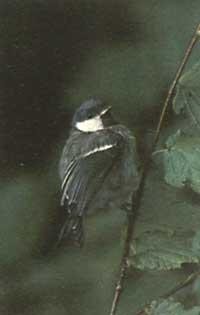The complex structure of bird singing surprises scientists
2016/03/08 Agirre Ruiz de Arkaute, Aitziber - Elhuyar Zientzia Iturria: Elhuyar aldizkaria
Analyzing the singing of the Japanese charcoal (Parus minor), bird communication is more complex than researchers thought, according to the work published today in the journal Nature Communications. In fact, the rattles use several basic notes for singing, but combining them they have seen that they create multidimensional calls, just as with limited words we create phrases of different meaning.

As it is a repertoire of limited communication elements, its combination and the increase in the number of meanings is called compositional syntax and so far has only been detected in human language. However, in this research they have realized that birds also use it.
The birds of the Kaskabeltz group perform songs of complex structure, with different notes (which researchers have called A, B, C, D…). They use more than ten different notes, single or combined: When they make an ABC call, for example, they warn their members of the danger of predators and class D is the call they make to approach the couple. However, the combination of both allowed a different meaning for unknown researchers.
To carry out the investigation, they recorded the taps and made several combinations of notes to the landlords to observe their reactions. So they knew that the birds understood differently ABC and D, or their combination ABC-D. The birds, when they heard the combined ABC-D call, immediately explored the horizon in search of predators, but also approached the speaker in search of their possible partner. On the other hand, when the call was artificially transformed (D-ABC), the birds did not join or move away. This means that the information provided by the note combination follows specific rules.
Researchers have recognized that with this work animal communication is more complex than they believed. If you wish, you can listen to the calls researchers have used to stimulate the chargers in:
--> Call ABC (risk warning), followed by the call D (to bring the couple closer) and finally the call ABC-D (to warn of the risk and approach at the same time).
--> Natural sequence ABC-D and artificially modified (D-ABC).

Gai honi buruzko eduki gehiago
Elhuyarrek garatutako teknologia




